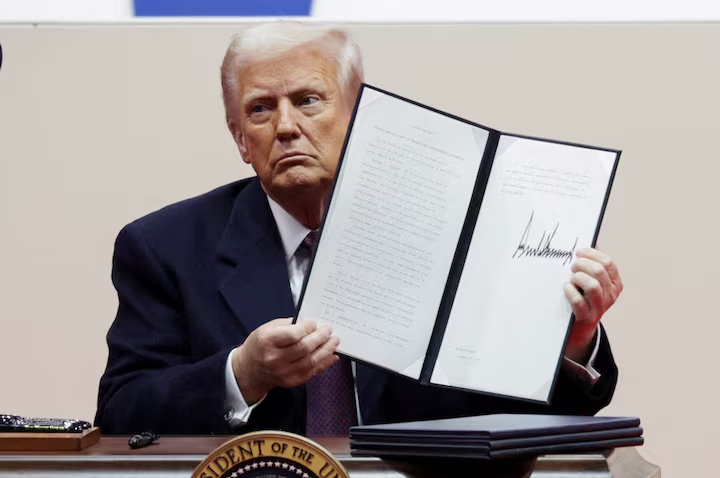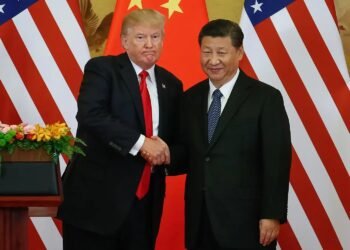Trump’s removal of critical AI safeguards comes as he announces a corporate-driven mega-project, raising concerns about the safety and ethical implications of unregulated AI expansion.
BY PC Bureau
A day after he repealed a 2023 executive order signed by former President Joe Biden that sought to establish robust safety protocols for AI development, President Donald Trump announced a massive $500 billion AI infrastructure initiative led by OpenAI, Oracle, and SoftBank, showcasing his administration’s focus on AI expansion while sidestepping concerns about its societal risks.
A Blind Pursuit of Corporate Gain
Trump’s decision to revoke Biden’s AI safety order has removed critical safeguards aimed at protecting consumers, workers, and national security. Biden’s order required AI developers to share safety test results with the government, helping to mitigate risks like biased decision-making, job displacement, and potential misuse of the technology. The removal of these measures leaves the public vulnerable to the unintended consequences of unchecked AI proliferation
Trump announces a $500 billion AI partnership with OpenAI, Oracle, and SoftBank.
The U.S. is stepping into the future with unprecedented investment.
This is how innovation becomes unstoppable with vision, resources, and action.pic.twitter.com/IPSY6ypKLJ— ☰ Sentinel ☰ (@FernOnX) January 21, 2025
Critics argue that Trump’s deregulatory approach reflects a prioritization of corporate profits over public safety. By eliminating oversight, the administration has opened the door for rapid AI advancements without accountability, effectively sidelining concerns about transparency and ethics.
The Stargate Project: A Testament to Trump’s Agenda
On Tuesday, Trump unveiled the Stargate project, a joint venture spearheaded by OpenAI, Oracle, and SoftBank to develop AI-focused data centers and energy infrastructure. While the initial $100 billion investment promises to expand AI capabilities and position the U.S. as a global leader, the project underscores the administration’s willingness to forgo public safety measures in favor of economic gains.
Sam Altman of OpenAI hailed the initiative as “the most important project of this era,” while Oracle’s Larry Ellison linked it to advancements in healthcare through digital records and potential customized vaccines. However, these lofty ambitions come with a darker undertone: the absence of regulations ensuring that AI systems are safe, unbiased, and accountable.
Why This Matters
The stakes are high. AI’s transformative potential spans industries, but its risks—job displacement, misinformation, and ethical dilemmas—loom large. Biden’s executive order aimed to create guardrails to address these challenges, emphasizing watermarking of AI-generated content, transparency in data usage, and mitigation of bias in AI models.
Trump’s repeal of these measures, paired with his emphasis on private-sector-led projects, sends a clear message: corporate interests take precedence. While investments like Stargate may fuel economic growth, they also expose workers and consumers to the pitfalls of unregulated AI, including exploitation, misinformation, and systemic inequities.
The Broader Picture
The Stargate project isn’t the first AI-related initiative with roots in Biden’s administration. Plans for the massive buildout of data centers and energy infrastructure predate Trump’s presidency. Yet, Trump has seized the opportunity to present these efforts as a hallmark of his leadership, even as his administration dismantles critical regulatory frameworks.
This approach aligns with Trump’s broader agenda of reducing government oversight, as exemplified by his creation of the “Department of Government Efficiency.” While the move to cut red tape may appeal to corporations, it risks leaving ordinary Americans unprotected from the potential fallout of poorly implemented AI systems.
The Path Forward
As Trump celebrates the economic promise of AI, critics are calling for a balanced approach that prioritizes both innovation and public safety. Without robust safeguards, the rapid expansion of AI threatens to exacerbate societal inequalities, displace jobs, and create unforeseen risks to national security.
The question remains: will Trump’s administration address these concerns, or will the pursuit of corporate gain continue to overshadow the public good? As AI transforms the global economy, the need for thoughtful regulation has never been more urgent.












